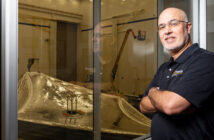A couple weeks ago, I was talking to the professor for whom I serve as a teacher’s apprentice. We were discussing an edit desk that I regretfully described as “cute.”
After the word left my mouth, I cringed. I hated — and still do hate — how I had described someone’s writing as “cute,” and I knew if someone had done the same to me — in my classic overthinking ways — I would’ve replayed the moment, taking offense.
I work in a newsroom, learn in a department and am about to enter an industry full of writers who take their craft seriously, and no writer wants their work denoted as “cute.”
Yet, there were reasons I instinctively referred to that piece of writing the way I did. These reasons apply to my own edit desks.
Throughout my tenure holding different editing positions, I’ve written about the importance of seeing the good when life gets hard; the importance of not overworking yourself in toxic ways; how New York City is too fast-paced; and the importance of emotional intelligence.
I’ve treated my edit desks as a polished diary of sorts, reflecting on something significant in my life, but nothing groundbreaking. Although I enjoy a coming-of-age tale, my edit desks have lacked the quality of that bolded header sitting atop its page: opinion.
Change is hard. Give yourself a break. Be kind, be empathetic and communicate. Of course, I believe in all of these things, and I believe there is value in sharing these lessons, but that is more accurately what they are: lessons, not opinions. Those past edit desks are riddled with clichés to prove it.
Among me being a sentimental mess with graduation approaching, my tendency to reflect and four years to think back on, I was prepared to file another “I am now older and wiser than my past self” story.
In January, I discovered I had been wearing shoes a half size too small. I was at the Converse store with my boyfriend looking to purchase a new pair of sneakers.
The store only had a half size larger than what I believed to be my size available. Feeling adamant about these platforms, I tried them on. They fit perfectly.
Trying to draw signifigance from this experience, I planned to talk about how although I believe discomfort is good, as it leads to growth, being unnecessarily uncomfortable is not. Yes, sizes fluctuate a bit among different brands, but it appeared I was deliberately wearing uncomfortable shoes for years, and I had gotten so used to the feeling that it became my normal.
Now, in storytelling fashion, I will not completely abandon this thread. However, the idea of it being important to find a balance between discomfort allowing for learning and discomfort causing harm is — again, important to learn for oneself — but boring and tiring to talk about.
Last semester, I completed a thesis titled “The Future of Rolling Stone and the Entertainment Magazine.” In my research, I spoke to writers and editors at publications I dream of working for: Rolling Stone, The FADER and Pitchfork.
They each lent some time to talking about music reviews. Although I don’t wish to write music criticism, opting instead for music features primarily because I most enjoy that kind of writing, this is not the only reason I shy away from reviews.
I love music, and, of course, I have thoughts on the artists and music I consume, but when thinking about writing reviews, I often ask myself, Why would someone listen to me? Am I qualified to have an opinion on music?
In part, I think this way because I haven’t formally studied music, and every opinion should be well-informed, but also because sharing your opinion can be hard.
We have opinions all the time — liking one thing and not another — but I find for most people, their opinions largely exist in sheltered environments: in your dorm with your roommate, at home with your family, out with your friends.
For the most part, these spaces are padded — thoughts lack substantial founding, aren’t fully traced back to reasons and are stunted by personal relationships with whom you’re conversing.
Having opinions outside of these instances — for example, on the page of a prominent publication or in a room subject to the judgment of strangers — requires reasoning and vulnerability.
We fear disagreement, being wrong and changing our minds. This is no doubt exacerbated by our political climate, which does not value discourse.
Having opinions is uncomfortable. Is that enough of an opinion? Maybe not, but hey, as the older and wiser version of myself, I’m learning — and that’s pretty cute.






Comment policy
Comments posted to The Brown and White website are reviewed by a moderator before being approved. Incendiary speech or harassing language, including comments targeted at individuals, may be deemed unacceptable and not published. Spam and other soliciting will also be declined.
The Brown and White also reserves the right to not publish entirely anonymous comments.